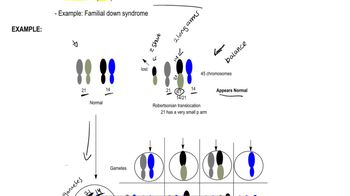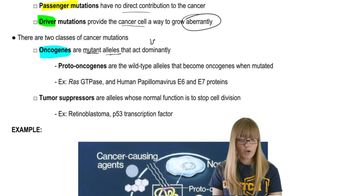Go to the website http://www.cancer.gov and select 'Cancer Types' on the top menu bar. Scroll down to 'Breast Cancer' and click. Select 'Cases & Prevention' from the options. Click 'More information' and select 'BRCA Mutations: Cancer Risk and Genetic Testing'. Use the information on this page to answer the following questions. As a special project, instead of selecting 'Breast Cancer' from the list of types of cancer, select another cancer you would like to know more about and produce a short summary of what you find.
Table of contents
- 1. Introduction to Genetics51m
- 2. Mendel's Laws of Inheritance3h 37m
- 3. Extensions to Mendelian Inheritance2h 41m
- 4. Genetic Mapping and Linkage2h 28m
- 5. Genetics of Bacteria and Viruses1h 21m
- 6. Chromosomal Variation1h 48m
- 7. DNA and Chromosome Structure56m
- 8. DNA Replication1h 10m
- 9. Mitosis and Meiosis1h 34m
- 10. Transcription1h 0m
- 11. Translation58m
- 12. Gene Regulation in Prokaryotes1h 19m
- 13. Gene Regulation in Eukaryotes44m
- 14. Genetic Control of Development44m
- 15. Genomes and Genomics1h 50m
- 16. Transposable Elements47m
- 17. Mutation, Repair, and Recombination1h 6m
- 18. Molecular Genetic Tools19m
- 19. Cancer Genetics29m
- 20. Quantitative Genetics1h 26m
- 21. Population Genetics50m
- 22. Evolutionary Genetics29m
19. Cancer Genetics
Overview of Cancer
Problem C.11b
Textbook Question
Go to the website http://www.ncbi.nlm.nih.gov/omim and enter 'Lynch syndrome' in the Search box at the top of the page. From the list of options given, select '#120435—Lynch Syndrome.' Use the information you retrieve to answer the following questions. What genes are most commonly mutated in Lynch syndrome?
 Verified step by step guidance
Verified step by step guidance1
Understand that Lynch syndrome is a hereditary condition associated with a higher risk of certain types of cancer, particularly colorectal cancer, caused by mutations in specific genes involved in DNA mismatch repair.
Go to the website http://www.ncbi.nlm.nih.gov/omim and enter 'Lynch syndrome' in the search box to access detailed genetic information about the syndrome.
From the search results, select the entry labeled '#120435—Lynch Syndrome' to view the curated genetic data related to this condition.
Review the gene section in the entry, which lists the genes most commonly mutated in Lynch syndrome. These genes typically include those involved in the DNA mismatch repair pathway.
Note the names of the key genes, such as MLH1, MSH2, MSH6, and PMS2, which are frequently reported as mutated in individuals with Lynch syndrome.
 Verified video answer for a similar problem:
Verified video answer for a similar problem:This video solution was recommended by our tutors as helpful for the problem above
Video duration:
2mPlay a video:
Was this helpful?
Key Concepts
Here are the essential concepts you must grasp in order to answer the question correctly.
Lynch Syndrome
Lynch syndrome is an inherited disorder that increases the risk of colorectal cancer and other cancers. It is caused by mutations in genes responsible for DNA mismatch repair, leading to genetic instability. Understanding this syndrome helps in identifying at-risk individuals and guiding genetic testing.
Recommended video:
Guided course

Robertsonian Translocations
DNA Mismatch Repair Genes
DNA mismatch repair (MMR) genes encode proteins that correct errors during DNA replication. Mutations in these genes impair repair mechanisms, causing accumulation of mutations and cancer development. Key MMR genes include MLH1, MSH2, MSH6, and PMS2, which are commonly mutated in Lynch syndrome.
Recommended video:
Guided course

Repair Pathways
Genetic Mutation and Cancer Risk
Mutations in specific genes can disrupt normal cellular functions and increase cancer susceptibility. In Lynch syndrome, inherited mutations in MMR genes lead to microsatellite instability and tumor formation. Recognizing these mutations is crucial for diagnosis, risk assessment, and preventive strategies.
Recommended video:
Guided course

Cancer Mutations

 9:51m
9:51mWatch next
Master Cancer Characteristics with a bite sized video explanation from Kylia
Start learningRelated Videos
Related Practice
Textbook Question
434
views
